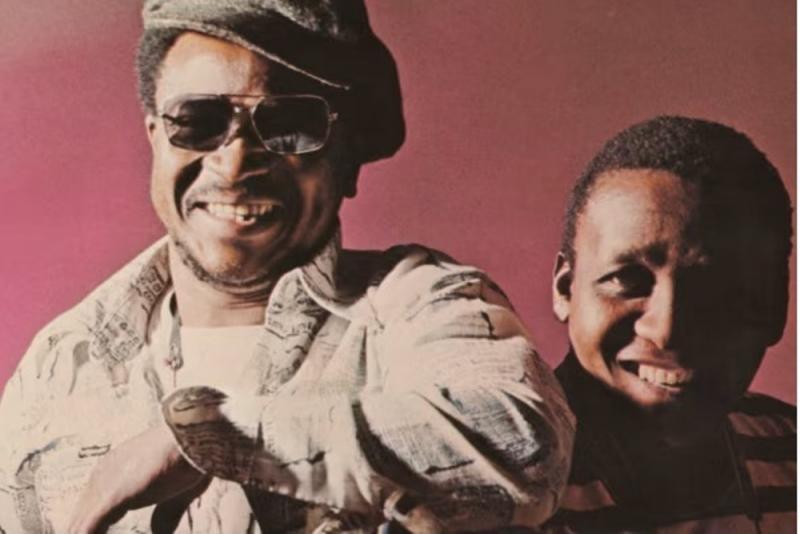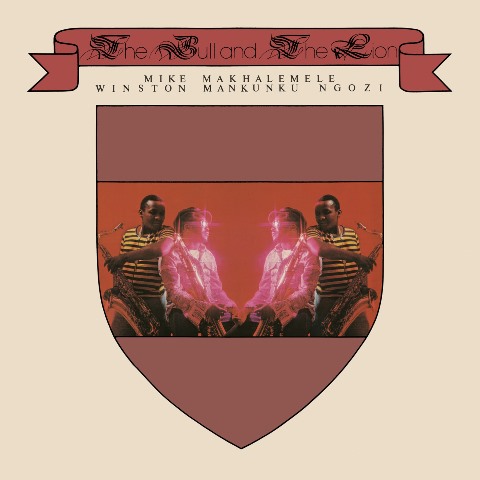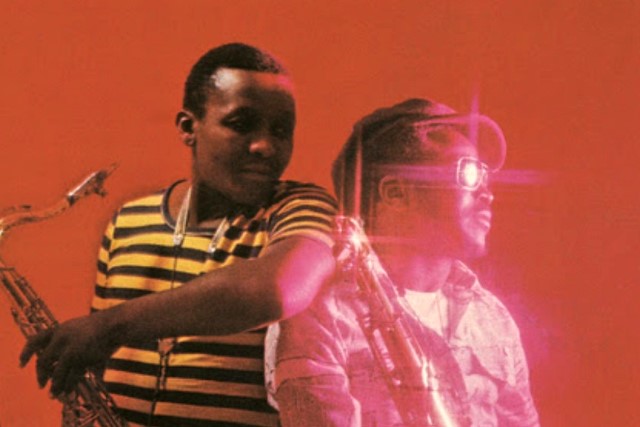Music Reissues Weekly: Mike Makhalemele & Winston “Mankunku” Ngozi - The Bull And The Lion | reviews, news & interviews
Music Reissues Weekly: Mike Makhalemele & Winston “Mankunku” Ngozi - The Bull And The Lion
Music Reissues Weekly: Mike Makhalemele & Winston “Mankunku” Ngozi - The Bull And The Lion
Important, Apartheid-flouting South African jazz album from 1976 re-emerges

The Bull And The Lion was originally released in 1976 by Jo'burg, a South African label which opened-up for business in 1973 with a couple of singles and the first album by black singer Margaret Singana. Her debut LP was titled Lady Africa. The same year, the imprint issued the second single by Rabbitt, a white pop-rock band whose guitarist Trevor Rabin became internationally known when he played with Manfred Mann and then joined Yes.
Jo'burg, it seems, was not bound by genre limitations and the strictures of working within Apartheid-era South Africa. After 1973, Singana and Rabbitt remained the label’s mainstays but, in 1975, the imprint released Mike Makhalemele’s The Peacemaker album. Makhalemele (1938–2000) was a tenor sax player who had been active from the mid Sixties. In 1986, he was heard on Paul Simon’s Graceland album. The Boyoyo Boys, his Seventies and Eighties band, issued a single titled "Puleng" in 1975. Eight years later, Malcolm McLaren reconfigured it – under his own name – as “Double Dutch.”
 For Jo'burg, Makhalemele’s next album was The Bull And The Lion. On the three-track LP (two on Side One, one on Side Two), he was billed with Winston “Mankunku” Ngozi (1943–2009), a tenor player who emerged a little later and was then in soul-inclined jazzers The Cliffs, whose Alex Express album was released by Jo’Burg in 1975.
For Jo'burg, Makhalemele’s next album was The Bull And The Lion. On the three-track LP (two on Side One, one on Side Two), he was billed with Winston “Mankunku” Ngozi (1943–2009), a tenor player who emerged a little later and was then in soul-inclined jazzers The Cliffs, whose Alex Express album was released by Jo’Burg in 1975.
On The Bull And The Lion, Makhalemele and Ngozi were backed by three-quarters of Rabbitt. While it was an inter-generational partnership, it was also – in Jo'burg style – a finger in eye to Apartheid: black musicians were in the studio with members of a white band. The Bull And The Lion was recorded at the Satbel Music Recording Studios, a state-of-the-art facility which opened in Johannesburg in 1975.
From a commercial perspective, teaming-up two known jazz players with members of a successful pop-rock band in a top-notch studio meant The Bull And The Lion was designed to be noticed. Nonetheless, original 1976 pressings do not often come up for sale and fetch around £150. Now, it is reissued.
 Side One is taken up by two tracks: the 8 minutes, 35 seconds “Togetherness” and “Snowfall” (05.35). On Side Two, it’s “Rainyday” (14:18). Side One’s pair of tracks are credited to Makhalemele. “Rainyday” is credited to Ngozi (as Mankunku). As Makhalemele is heard on Side One only and Ngozi is on Side Two only, The Bull And The Lion is not a collaboration between them. Instead, it is collaboration between each sax player and the members of Rabbitt.
Side One is taken up by two tracks: the 8 minutes, 35 seconds “Togetherness” and “Snowfall” (05.35). On Side Two, it’s “Rainyday” (14:18). Side One’s pair of tracks are credited to Makhalemele. “Rainyday” is credited to Ngozi (as Mankunku). As Makhalemele is heard on Side One only and Ngozi is on Side Two only, The Bull And The Lion is not a collaboration between them. Instead, it is collaboration between each sax player and the members of Rabbitt.
The Bull And The Lion is – as its backstory confirms – a crossover album. Rabin’s guitar leans throughout towards the funky, and he uses a wah-wah pedal. Tete Mbambisa – a South African jazz lynchpin since the early Sixties – guests on piano, which is more about adding feel and mood than taking the lead even when he contributes a lengthy passage to “Togetherness” (the player of the organ heard on Side Two receives no credit). Mostly, the other musicians are there to provide a bed for Makhalemele and Ngozi. The latter’s lengthy solo on “Rainyday” edges into John Coltrane territory but the flight is restrained: it feels as if the playing consciously aims for a pleasing smoothness. Makhalemele’s two Side One showcases, though, are more percussive and, like his band The Cliffs, lean towards soul – even when he’s letting rip during “Togetherness.” For “Snowfall” he dominates, setting the pace for the groove running through the track.
Makhalemele and Ngozi did not appear on the same record again until they were amongst those heard on 1995’s African Summit album. Presumably, in 1976, they and their label Jo'burg found that The Bull And The Lion did not have the hoped-for impact. If this is the case, it’s a pity as an album which disregarded Apartheid to bridge the barriers between jazz and rock players was significant. After too long, its importance can now be appreciated.
- Next week: The Long Ryders' Native Sons becomes a box set
- More reissue reviews on theartsdesk
- Kieron Tyler’s website
Explore topics
Share this article
The future of Arts Journalism
You can stop theartsdesk.com closing!
We urgently need financing to survive. Our fundraising drive has thus far raised £49,000 but we need to reach £100,000 or we will be forced to close. Please contribute here: https://gofund.me/c3f6033d
And if you can forward this information to anyone who might assist, we’d be grateful.

Subscribe to theartsdesk.com
Thank you for continuing to read our work on theartsdesk.com. For unlimited access to every article in its entirety, including our archive of more than 15,000 pieces, we're asking for £5 per month or £40 per year. We feel it's a very good deal, and hope you do too.
To take a subscription now simply click here.
And if you're looking for that extra gift for a friend or family member, why not treat them to a theartsdesk.com gift subscription?
more New music
 Trio da Kali, Milton Court review - Mali masters make the ancient new
Three supreme musicians from Bamako in transcendent mood
Trio da Kali, Milton Court review - Mali masters make the ancient new
Three supreme musicians from Bamako in transcendent mood
 Hollie Cook's 'Shy Girl' isn't heavyweight but has a summery reggae lilt
Tropical-tinted downtempo pop that's likeable if uneventful
Hollie Cook's 'Shy Girl' isn't heavyweight but has a summery reggae lilt
Tropical-tinted downtempo pop that's likeable if uneventful
 Pop Will Eat Itself's 'Delete Everything' is noisy but patchy
Despite unlovely production, the Eighties/Nineties unit retain rowdy ebullience
Pop Will Eat Itself's 'Delete Everything' is noisy but patchy
Despite unlovely production, the Eighties/Nineties unit retain rowdy ebullience
 Music Reissues Weekly: The Earlies - These Were The Earlies
Lancashire and Texas unite to fashion a 2004 landmark of modern psychedelia
Music Reissues Weekly: The Earlies - These Were The Earlies
Lancashire and Texas unite to fashion a 2004 landmark of modern psychedelia
 Odd times and clunking lines in 'The Life of a Showgirl' for Taylor Swift
A record this weird should be more interesting, surely
Odd times and clunking lines in 'The Life of a Showgirl' for Taylor Swift
A record this weird should be more interesting, surely
 Waylon Jennings' 'Songbird' raises this country great from the grave
The first of a trove of posthumous recordings from the 1970s and early 1980s
Waylon Jennings' 'Songbird' raises this country great from the grave
The first of a trove of posthumous recordings from the 1970s and early 1980s
 Lady Gaga, The Mayhem Ball, O2 review - epic, eye-boggling and full of spirit
One of the year's most anticipated tours lives up to the hype
Lady Gaga, The Mayhem Ball, O2 review - epic, eye-boggling and full of spirit
One of the year's most anticipated tours lives up to the hype
 Slovenian avant-folk outfit Širom’s 'In the Wind of Night, Hard-Fallen Incantations Whisper' opens the door to inner space
Unconventional folk-based music which sounds like nothing else
Slovenian avant-folk outfit Širom’s 'In the Wind of Night, Hard-Fallen Incantations Whisper' opens the door to inner space
Unconventional folk-based music which sounds like nothing else
 'The Art of Loving': Olivia Dean's vulnerable and intimate second album
Neo soul Londoner's new release outgrows her debut
'The Art of Loving': Olivia Dean's vulnerable and intimate second album
Neo soul Londoner's new release outgrows her debut
 Music Reissues Weekly: The Peanut Butter Conspiracy - The Most Up Till Now
Definitive box-set celebration of the Sixties California hippie-pop band
Music Reissues Weekly: The Peanut Butter Conspiracy - The Most Up Till Now
Definitive box-set celebration of the Sixties California hippie-pop band
 Doja Cat's 'Vie' starts well but soon tails off
While it contains a few goodies, much of the US star's latest album lacks oomph
Doja Cat's 'Vie' starts well but soon tails off
While it contains a few goodies, much of the US star's latest album lacks oomph

Add comment